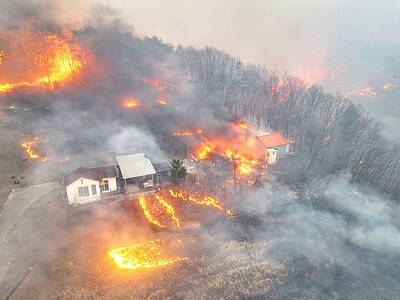There are precious few hints of the social revolutionary around Kim Seok-kwan, the 52-year-old doctor who single-handedly brought sex-change surgery to this deeply conservative country.
But there is no gainsaying Kim's audacity in introducing sex-change operations here in 1986. Nor do many South Koreans dispute the impact his surgery has had on a society where, even quite recently, sexual matters were mostly whispered about and few dared live openly as homosexuals.
That all began to change with the emergence of superstar Ha Risu, a slinky, silky-haired singer, actor, comedienne and model, armed with a 35-24-35 figure, who is now a fixture in the Korean entertainment firmament. Ha, whose adopted stage name is a play on the English phrase Hot Issue, lived most of her 28 years, unhappily, as a man, until Kim transformed her into a ravishing transgender beauty three years ago.
Kim is a plastic surgeon whose training was in facial and cranial operations, getting his start in sex-change surgery almost by accident. For years he performed the operations largely in obscurity, with awareness of his skills with a scalpel spreading mostly by word of mouth.
"In 1986, a male transvestite approached me and asked me if I could perform a sex-change operation," Kim said. "At that time, nobody knew anything about this sort of thing in Korea, and I told him I couldn't help him."
A couple of months later, the doctor said, another man approached him asking for a sex change. With that, Kim said he became intrigued enough to start reading up on the subject. Within a short time, Kim called the patient back and said he would operate.
The surgery was a first for South Korea. Not only that, but Kim also rejected the use of skin grafts for vaginal construction, which was the standard at the time.
Although the operation's success exceeded expectations, soon afterward Kim went to the University of California at Davis for a year to study more about sex change surgery. When he returned, he found a long list of candidates desperate for the operation.
For the first few years of performing gender-change surgery, Kim said, his patients were overwhelmingly working class or poor, and few could afford to travel abroad for the operation.
The first glimmers of celebrity came to Kim in 1991, with his first female-to-male surgery, which he also pioneered here. That operation caught the attention of the nation's news media.
The brouhaha eventually died down, but by the time it did, something had changed in Korean society. Taboo had been lifted, and sexual mores were suddenly being discussed much more openly in the media and portrayed with more realism in film.

DEATH CONSTANTLY LOOMING: Decades of detention took a major toll on Iwao Hakamada’s mental health, his lawyers describing him as ‘living in a world of fantasy’ A Japanese man wrongly convicted of murder who was the world’s longest-serving death row inmate has been awarded US$1.44 million in compensation, an official said yesterday. The payout represents ¥12,500 (US$83) for each day of the more than four decades that Iwao Hakamada spent in detention, most of it on death row when each day could have been his last. It is a record for compensation of this kind, Japanese media said. The former boxer, now 89, was exonerated last year of a 1966 quadruple murder after a tireless campaign by his sister and others. The case sparked scrutiny of the justice system in

DITCH TACTICS: Kenyan officers were on their way to rescue Haitian police stuck in a ditch suspected to have been deliberately dug by Haitian gang members A Kenyan policeman deployed in Haiti has gone missing after violent gangs attacked a group of officers on a rescue mission, a UN-backed multinational security mission said in a statement yesterday. The Kenyan officers on Tuesday were on their way to rescue Haitian police stuck in a ditch “suspected to have been deliberately dug by gangs,” the statement said, adding that “specialized teams have been deployed” to search for the missing officer. Local media outlets in Haiti reported that the officer had been killed and videos of a lifeless man clothed in Kenyan uniform were shared on social media. Gang violence has left

‘HUMAN NEGLIGENCE’: The fire is believed to have been caused by someone who was visiting an ancestral grave and accidentally started the blaze, the acting president said Deadly wildfires in South Korea worsened overnight, officials said yesterday, as dry, windy weather hampered efforts to contain one of the nation’s worst-ever fire outbreaks. More than a dozen different blazes broke out over the weekend, with Acting South Korean Interior and Safety Minister Ko Ki-dong reporting thousands of hectares burned and four people killed. “The wildfires have so far affected about 14,694 hectares, with damage continuing to grow,” Ko said. The extent of damage would make the fires collectively the third-largest in South Korea’s history. The largest was an April 2000 blaze that scorched 23,913 hectares across the east coast. More than 3,000

‘INCREDIBLY TROUBLESOME’: Hours after a judge questioned the legality of invoking a wartime power to deport immigrants, the president denied signing the proclamation The US on Friday said it was terminating the legal status of hundreds of thousands of immigrants, giving them weeks to leave the country. US President Donald Trump has pledged to carry out the largest deportation campaign in US history and curb immigration, mainly from Latin American nations. The order affects about 532,000 Cubans, Haitians, Nicaraguans and Venezuelans who came to the US under a scheme launched in October 2022 by Trump’s predecessor, Joe Biden, and expanded in January the following year. They would lose their legal protection 30 days after the US Department of Homeland Security’s order is published in the Federal